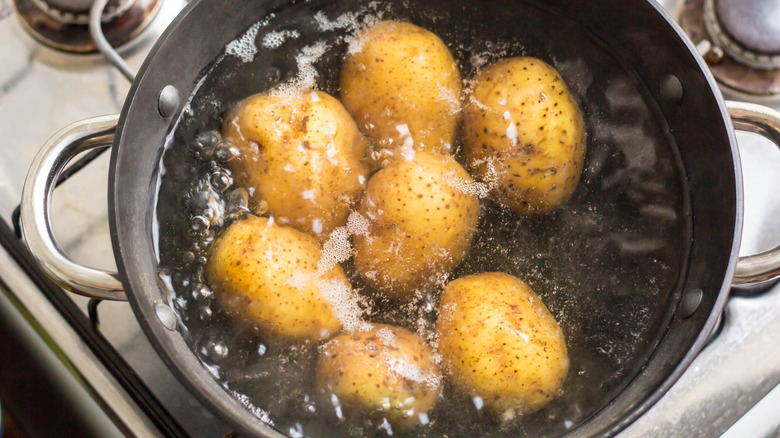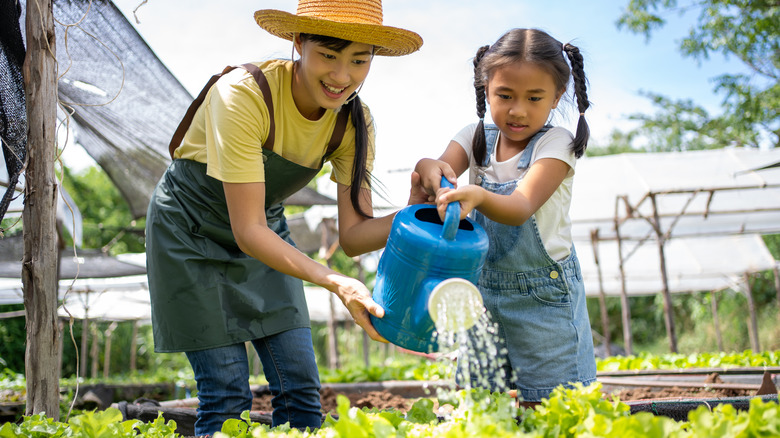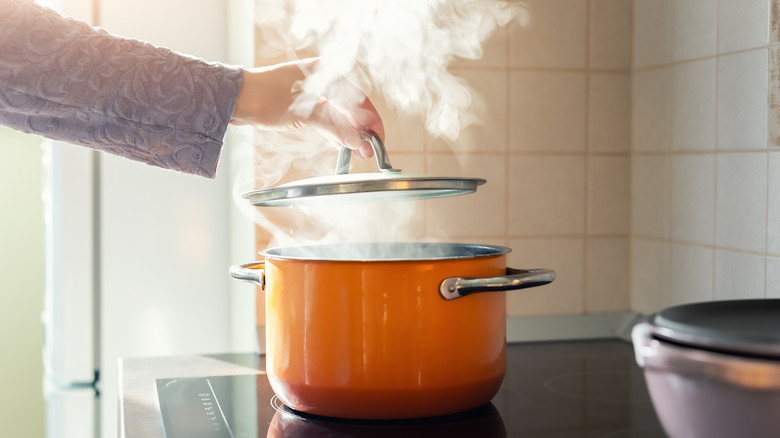Don't Throw Out The Water Next Time You Boil Veggies. Here's Why
Boiling veggies is one of the most convenient and easy ways to cook them. Simply set a pot of water on the stove, dump in the veggies, turn it on, leave it alone for a while, and voilà! You have cooked vegetables. Despite being super convenient, boiling has gotten a bad rap as a cooking method because it causes nutrient loss. In fact, when you boil vegetables, almost all of the water-soluble vitamins (like B and C) and a portion of minerals like zinc, potassium, calcium, and iron leech out of the veggies and end up in the water, per Sutter Health. However, that doesn't mean you should never boil vegetables.
Instead, when you do choose this method of cooking, use the leftover nutrient-rich vegetable water as fertilizer for your plants. This way you can avoid dumping that beneficial water down the drain and, at the same time, add some of those important vitamins and minerals back into your garden. This method is especially great for potted house plants that tend to live in nutrient-depleted soil, but it can also be beneficial for garden flowers and vegetables. To do it, you should first allow your vegetable water to cool completely. Then, add it to your plants in the same amount that you would add regular water.
How vegetable water helps plants
The main reason that adding your cooled leftover cooking water to plants is beneficial is that it contains many of the nutrients that plants need to grow such as nitrogen, calcium, and iron. If your plants have yellow leaves, a dull color, or aren't fruiting, this may be a sign that they are lacking in some of these essential minerals. Also, the added vegetable water won't just benefit your current plants. Any of the leftover nutrients from the vegetables that aren't absorbed by the plant will remain in the soil, making it overall healthier and better for growing.
However, while this method is super useful, it is important to never add leftover vegetable water that contains salt to any plants. This is because salt is toxic to all types of plant life and will kill it. Furthermore, adding salt to soil may prevent other plants from growing in the same location for years. Therefore, if you know you will be adding a pot of veggie water to your plants, refrain from seasoning your vegetables with salt until after you've strained the water and set it aside to cool.
Use boiling water as a weed killer
If you don't have many potted or garden plants around your house, you can still use the leftover vegetable water in other ways. In fact, boiling or near-boiling water makes an excellent weed killer because it wilts the plant as soon as it touches it. However, for this method to be effective, you should use it on young plants. For older, more stubborn weeds, you will need to add boiling water multiple times to the area the plant was growing in over a few weeks to make sure that you've killed the weed down to the root. Otherwise, it will just come back later.
Furthermore, you should only use this weed-killing method in areas of your yard where you don't want any plants to grow in the future. Some examples of good areas to pour boiling water include the cracks in your driveway or firepit. This is because the boiling water will not only kill the plant but also kill many of the beneficial microbes in the soil making it hard for other plants to thrive in the same area. So, for your garden and yard, the old-fashioned method of pulling weeds with your hands is still the best way to go.


